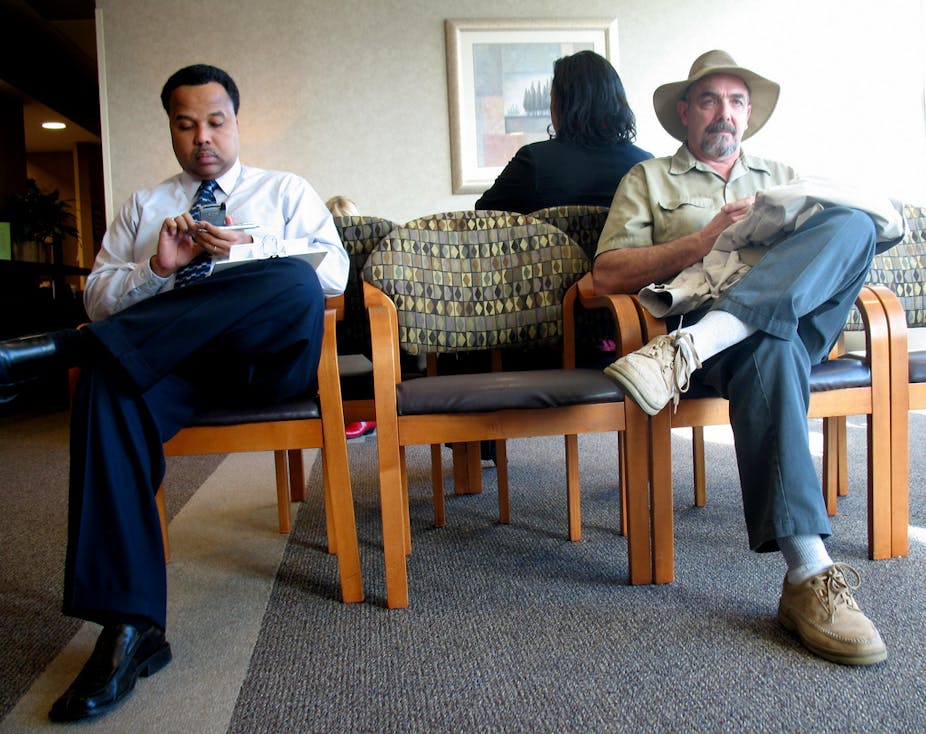Should health professionals play a role in identifying would-be terrorists? If you’re in the United Kingdom, the answer seems to be yes.
In 2007, the United Kingdom launched a counter-terrorism strategy called Prevent. It sought to stop terrorism before it began by preventing people from becoming, or supporting, terrorists.
Last week, the UK government released a review of this strategy. Among the changes was an expanded role for health professionals, requiring them to help identify those “vulnerable to radicalisation”.
Once identified, a vulnerable person is referred to support services such as counselling.
This proposal has been criticised by the British Medical Association (BMA) which is concerned such reporting extends beyond the doctor’s role.
Assessing patients for the risk of being “drawn into terrorism” would undermine the essential doctor/patient relationship and confidentiality.
In both the UK and Australia, doctors are already permitted to breach patient confidentiality in certain circumstances. If doctors have a “reasonable belief” that someone might blow up a bus, for example, they can breach confidentiality because it is in the public interest.
But forming a “reasonable belief” that someone is going to blow up a bus is quite different from evaluating a patient’s likelihood of growing “to support terrorism and forms of extremism leading to terrorism”.
This type of assessment seems to require doctors to evaluate what Monash University Professors Jude McCulloch and Sharon Pickering call “risky [character] types…and thoughts”, rather than “risky acts…and…deeds”.
This is part of a “pre-emptive” approach to countering terrorism (stopping threats of terrorism before they develop), which McCulloch and Pickering argue is a feature of many Australian counter-terrorism laws.
McCulloch and Pickering claim that pre-emptive legislation is “unlikely…to prevent terrorism”. A pre-emptive focus on assessing “vulnerability to radicalisation” could lead to a mountain of reports that require extensive resources to manage but are ultimately useless.
But, if a doctor was required to make such an assessment there are number of obvious questions to ask:
How would they make such an assessment?
How would the process be enforced and managed?
If a doctor failed to make an assessment and the patient became a terrorist, what would the consequences be for the doctor?
These questions identify difficulties with the proposal but it is true that assessing patient “vulnerability”, in different circumstances, is already being done.
Doctors can, for example, hospitalise those with a mental illness against the patient’s will if they are believed to be at risk of harming themselves or others. But this an option of last resort which involves a long process with many safety nets to protect the patient’s rights.
The “protection for self and others” justification in mental health is similar to those in counter-terrorism laws. But diagnosing a “vulnerability to radicalisation” would be far more difficult than diagnosing hallucinations and delusions.
It could put certain sections of the community, such as Islamic groups, at risk of being reported more often than others.
We have fallen into the trap of discriminating on the basis of stereotypes before. So much so that some mental health laws now clearly outline what does not constitute a mental illness.
In NSW, for example, patients are not deemed mentally ill, or a risk to themselves or others, because of their particular religious opinions, beliefs, philosophy, or political activities, to ensure that people were not locked away just because they expressed a different view to others.
Patient rights are also enshrined internationally in the Declaration of Geneva (the modern day Hippocratic Oath), which states a doctor should not “use … medical knowledge to violate human rights and civil liberties, even under threat”.
Asking doctors to make predictions about a patient’s future actions or beliefs compromises the doctor’s professionalism. It also potentially erodes their patient’s human rights – to freedom of speech, of association, of religion and liberty.
There is no denying governments have a duty to defend their citizens against threats. But they also have a responsibility to protect the rights of the individual and this presents governments with a dilemma.
The fight against terrorism is, in part, a fight for human rights and the rule of law. Any government that abandons human rights protections in the name of “security”, arguably fails in this aspect of their responsiblity to their people.
The UK proposal suggests a poor attempt by government to “medicalise” this issue and in that way require doctors to partake in the regulation and promotion of social order and control.
This is beyond the doctors’ primary purpose of promoting good health. This is not a job for the GP.
What do you think about the idea of health professionals identifying patients who might be “vulnerable to radicalisation”? Leave your views below.

